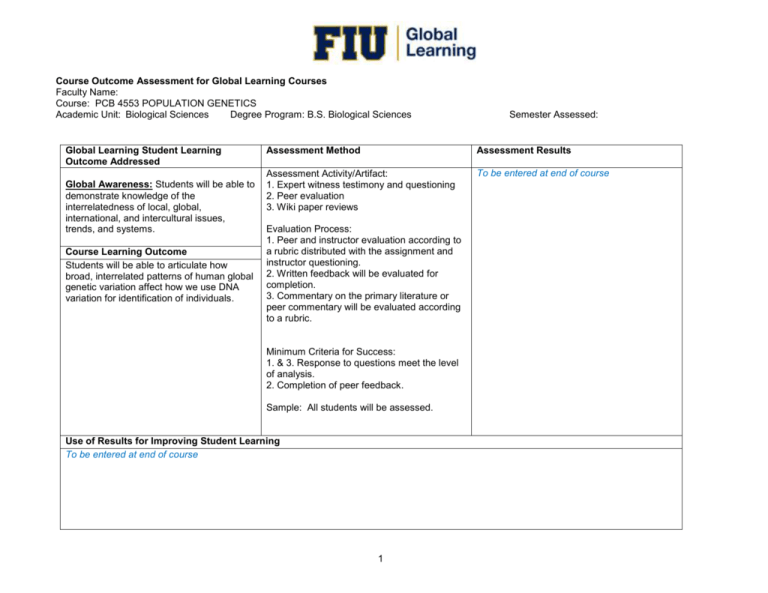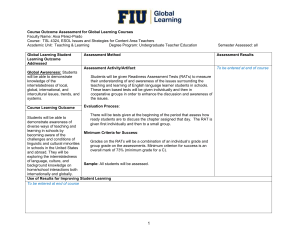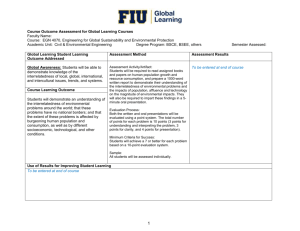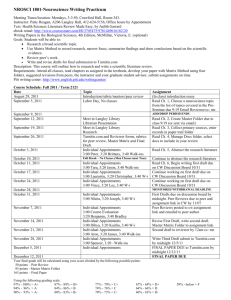Matrix - FIU Global Learning
advertisement

Course Outcome Assessment for Global Learning Courses Faculty Name: Course: PCB 4553 POPULATION GENETICS Academic Unit: Biological Sciences Degree Program: B.S. Biological Sciences Global Learning Student Learning Outcome Addressed Global Awareness: Students will be able to demonstrate knowledge of the interrelatedness of local, global, international, and intercultural issues, trends, and systems. Course Learning Outcome Students will be able to articulate how broad, interrelated patterns of human global genetic variation affect how we use DNA variation for identification of individuals. Semester Assessed: Assessment Method Assessment Results Assessment Activity/Artifact: 1. Expert witness testimony and questioning 2. Peer evaluation 3. Wiki paper reviews To be entered at end of course Evaluation Process: 1. Peer and instructor evaluation according to a rubric distributed with the assignment and instructor questioning. 2. Written feedback will be evaluated for completion. 3. Commentary on the primary literature or peer commentary will be evaluated according to a rubric. Minimum Criteria for Success: 1. & 3. Response to questions meet the level of analysis. 2. Completion of peer feedback. Sample: All students will be assessed. Use of Results for Improving Student Learning To be entered at end of course 1 Course Outcome Assessment for Global Learning Courses Faculty Name: Course: PCB 4553 POPULATION GENETICS Academic Unit: Biological Sciences Degree Program: B.S. Biological Sciences Global Learning Student Learning Outcome Addressed Global Perspective: Students will be able to conduct a multi-perspective analysis of local, global, international, and intercultural problems. Course Learning Outcome Students will be able to compare and contrast how different DNA technologies can affect identification of individuals based on forensic evidence. Semester Assessed: Assessment Method Assessment Results Assessment Activity/Artifact: 1. Expert witness testimony and questioning 2. Wiki commentary on primary literature To be entered at end of course Evaluation Process: 1.-2. Peer and instructor evaluation according to a rubric distributed with the assignment. Minimum Criteria for Success: 1. Responses to questions meet level of analysis. 2. Written feedback will be evaluated for completion. 3. Commentary meets level of descriptive evaluation of primary literature. Sample: All students will be assessed. Use of Results for Improving Student Learning To be entered at end of course 2 Course Outcome Assessment for Global Learning Courses Faculty Name: Course: PCB 4553 POPULATION GENETICS Academic Unit: Biological Sciences Degree Program: B.S. Biological Sciences Global Learning Student Learning Outcome Addressed Global Engagement: Students will be able to demonstrate willingness to engage in local, global, international, and intercultural problem solving. Course Learning Outcome Students will be able to reflect before and after the course about how it impacts their future practice in terms of their ability to give expert testimony and do research in population genetics. Semester Assessed: Assessment Method Assessment Results Assessment Activity/Artifact: Wiki writing assignments To be entered at end of course Evaluation Process: Peer and instructor evaluation according to rubric. Students submit a first draft of their proposal, which is reviewed by the instructor and peer evaluators. Students resubmit proposals after these, allowing pre- and post-assignment evaluation of global engagement. Minimum Criteria for Success: Ability to articulate a research question in a grant proposal at the level of analysis. Thoroughness of both the individual’s proposal and evaluation of peer proposals will also be considered towards completion of the learning outcome. Sample: All students will be evaluated. Use of Results for Improving Student Learning To be entered at end of course 3









